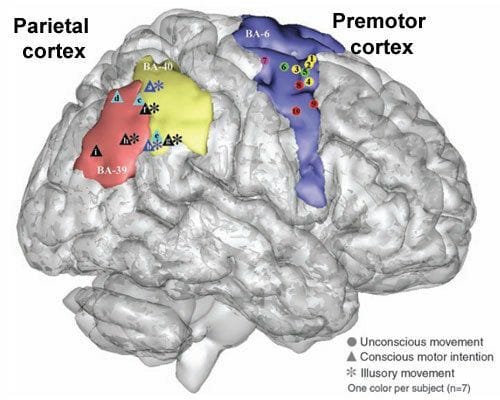For Free Will, Aren’t the Brain and Brain Tumor Identical?

Let’s assume we’re all determinists as it pertains to free will (compatibilists believe determinism is consistent with free will). So we’re all agreeing that there is nothing but physics, and that events are nothing but chains of causes rippling through time.
Good. That’s where all but the Libertarians agree, and none of us is a Libertarian.
So now on to where we disagree.
Believers in free will think that when humans contemplate options presented to them consciously, and then act on the one they find most attractive without being perceivably constrained, that they are exercising free will. They believe this standard and definition is sufficient to serve as a basis for moral responsibility, which is the real point of all of this.
I believe that the standard laid out above is quite practical and intuitive, but that the key to its fault is in the constraint point. If someone were to behave badly, and we were to find out that they did so because of a brain tumor, or because they were being controlled by an evil genius device, we would absolve them of their wrong-doing.
My point is simply that this exact thing is happening—even when we feel we’re in control. My argument is that physics and chemistry are identical to a brain tumor or remote control device in every sense other than being obviously external to the person, and because these control devices of (physics and chemistry) are equally outside of the control of the subject, they equally absolve him/her of their actions.
It is my belief that in order to demonstrate a morally valid distinction between the brain tumor and regular chemistry/physics that cause all our actions, one must show how you’re in control in one and not in control in the other. Unfortunately, the fact is that when someone is behaving badly due to a brain tumor, they claim to be every bit as in control as when they’re not under that influence.
So saying someone is "being themselves" is really a matter of perspective, and comparison to what others remember them doing, and seeing if it hits any threshold for deviation.
So if someone wakes up every day and does the same sort of things they normally do (being compelled by their normal biology/chemistry/physics) then they are free. But if they’re suddenly compelled by an extra piece of themselves (such as a brain tumor) that trips a flag with others that they’re behaving strangely, now they’re "not being themselves".
The issue is that to the subject with the tumor, they experienced the exact same amount of choice the whole time. And I would argue that this is true, and that amount is none.
To argue against this requires some significant contortions regarding the definition of freedom. One must add to the definition an extra component for "not just if they feel free, but if others think they’re acting like themselves", and you can see where that will get messy very quickly.
All this essentially reduces to a single point: feeling as if we’re free, and experiencing making choices, is not an adequate standard for moral responsibility. As the case of the brain tumor shows, one can be compelled quite strongly to act without detecting it in any way whatsoever, i.e., they’re still experiencing absolute freedom, and I am simply saying that this is exactly what’s happening for everyone, for every choice they make, with biology/chemistry/physics being the brain tumor.
In short, if people aren’t responsible for their actions while being compelled by a brain tumor, then how can we hold them responsible when they’re being compelled by their brains?
The distinction between the two is sufficiently clear for the crude work of practical criminal justice, but I believe a much sharper and more tangible distinction distinction must be drawn to reach the high standard of true moral responsibility.
Notes
I got the brain tumor example, which I consider to be excellent, from Sam Harris.